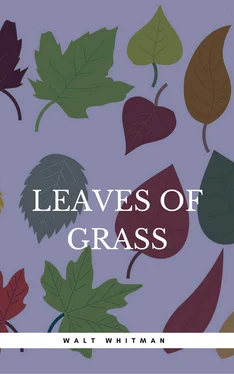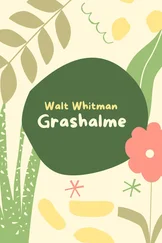Walt Whitman - Leaves of Grass
Здесь есть возможность читать онлайн «Walt Whitman - Leaves of Grass» — ознакомительный отрывок электронной книги совершенно бесплатно, а после прочтения отрывка купить полную версию. В некоторых случаях можно слушать аудио, скачать через торрент в формате fb2 и присутствует краткое содержание. ISBN: , Жанр: Языкознание, Критика, на английском языке. Описание произведения, (предисловие) а так же отзывы посетителей доступны на портале библиотеки ЛибКат.
- Название:Leaves of Grass
- Автор:
- Жанр:
- Год:неизвестен
- ISBN:9782377930524
- Рейтинг книги:4 / 5. Голосов: 1
-
Избранное:Добавить в избранное
- Отзывы:
-
Ваша оценка:
- 80
- 1
- 2
- 3
- 4
- 5
Leaves of Grass: краткое содержание, описание и аннотация
Предлагаем к чтению аннотацию, описание, краткое содержание или предисловие (зависит от того, что написал сам автор книги «Leaves of Grass»). Если вы не нашли необходимую информацию о книге — напишите в комментариях, мы постараемся отыскать её.
Leaves of Grass — читать онлайн ознакомительный отрывок
Ниже представлен текст книги, разбитый по страницам. Система сохранения места последней прочитанной страницы, позволяет с удобством читать онлайн бесплатно книгу «Leaves of Grass», без необходимости каждый раз заново искать на чём Вы остановились. Поставьте закладку, и сможете в любой момент перейти на страницу, на которой закончили чтение.
Интервал:
Закладка:
Beautiful women, the haughtiest nations, laws, the landscape, people and animals,
The profound earth and its attributes, and the unquiet ocean,
All enjoyments and properties, and money, and whatever money will buy,
The best farms . . . . others toiling and planting, and he unavoidably reaps,
The noblest and costliest cities . . . . others grading and building, and he domiciles there;
Nothing for any one but what is for him . . . . near and far are for him,
The ships in the offing . . . . the perpetual shows and marches on land are for him if they are for any body.
He puts things in their attitudes,
He puts today out of himself with plasticity and love,
He places his own city, times, reminiscences, parents, brothers and sisters, associations employment and politics, so that the rest never shame them afterward, nor assume to command them.
He is the answerer,
What can be answered he answers, and what cannot be answered he shows how it cannot be answered.
A man is a summons and challenge,
It is vain to skulk . . . . Do you hear that mocking and laughter? Do you hear the ironical echoes?
Books friendships philosophers priests action pleasure pride beat up and down seeking to give satisfaction;
He indicates the satisfaction, and indicates them that beat up and down also.
Whichever the sex . . . whatever the season or place he may go freshly and gently and safely by day or by night,
He has the passkey of hearts . . . . to him the response of the prying of hands on the knobs.
His welcome is universal . . . . the flow of beauty is not more welcome or universal than he is,
The person he favors by day or sleeps with at night is blessed.
Every existence has its idiom . . . . every thing has an idiom and tongue;
He resolves all tongues into his own, and bestows it upon men . . and any man translates . . and any man translates himself also:
One part does not counteract another part . . . . He is the joiner . . he sees how they join.
He says indifferently and alike, How are you friend? to the President at his levee,
And he says Good day my brother, to Cudge that hoes in the sugarfield;
And both understand him and know that his speech is right.
He walks with perfect ease in the capitol,
He walks among the Congress . . . . and one representative says to another, Here is our equal appearing and new.
Then the mechanics take him for a mechanic,
And the soldiers suppose him to be a captain . . . . and the sailors that he has followed the sea,
And the authors take him for an author . . . . and the artists for an artist,
And the laborers perceive he could labor with them and love them;
No matter what the work is, that he is one to follow it or has followed it,
No matter what the nation, that he might find his brothers and sisters there.
The English believe he comes of their English stock,
A Jew to the Jew he seems . . . . a Russ to the Russ . . . . usual and near . . removed from none.
Whoever he looks at in the traveler’s coffeehouse claims him,
The Italian or Frenchman is sure, and the German is sure, and the Spaniard is sure . . . . and the island Cuban is sure.
The engineer, the deckhand on the great lakes or on the Mississippi or St Lawrence or Sacramento or Hudson or Delaware claims him.
The gentleman of perfect blood acknowledges his perfect blood,
The insulter, the prostitute, the angry person, the beggar, see themselves in the ways of him . . . . he strangely transmutes them,
They are not vile any more . . . . they hardly know themselves, they are so grown.
You think it would be good to be the writer of melodious verses,
Well it would be good to be the writer of melodious verses;
But what are verses beyond the flowing character you could have? . . . . or beyond beautiful manners and behaviour?
Or beyond one manly or affectionate deed of an apprenticeboy? . . or old woman? . . or man that has been in prison or is likely to be in prison?
1855:8
Suddenly out of its stale and drowsy lair, the lair of slaves,
Like lightning Europe le’pt forth . . . . half startled at itself,
Its feet upon the ashes and the rags . . . . Its hands tight to the throats of kings.
O hope and faith! O aching close of lives! O many a sickened heart!
Turn back unto this day, and make yourselves afresh.
And you, paid to defile the People . . . . you liars mark:
Not for numberless agonies, murders, lusts,
For court thieving in its manifold mean forms,
Worming from his simplicity the poor man’s wages;
For many a promise sworn by royal lips, And broken, and laughed at in the breaking,
Then in their power not for all these did the blows strike of personal revenge . . or the heads of the nobles fall;
The People scorned the ferocity of kings.
But the sweetness of mercy brewed bitter destruction, and the frightened rulers come back:
Each comes in state with his train . . . . hangman, priest and tax-gatherer . . . . soldier, lawyer, jailer and sycophant.
Yet behind all, lo, a Shape,
Vague as the night, draped interminably, head front and form in scarlet folds,
Whose face and eyes none may see,
Out of its robes only this . . . . the red robes, lifted by the arm,
One finger pointed high over the top, like the head of a snake appears.
Meanwhile corpses lie in new-made graves . . . . bloody corpses of young men:
The rope of the gibbet hangs heavily . . . . the bullets of princes are flying . . . . the creatures of power laugh aloud,
And all these things bear fruits . . . . and they are good.
Those corpses of young men,
Those martyrs that hang from the gibbets . . . those hearts pierced by the gray lead,
Cold and motionless as they seem . . live elsewhere with unslaughter’d vitality.
They live in other young men, O kings,
They live in brothers, again ready to defy you:
They were purified by death . . . . They were taught and exalted.
Not a grave of the murdered for freedom but grows seed for freedom . . . . in its turn to bear seed,
Which the winds carry afar and re-sow, and the rains and the snows nourish.
Not a disembodied spirit can the weapons of tyrants let loose,
But it stalks invisibly over the earth . . whispering counseling cautioning.
Liberty let others despair of you . . . . I never despair of you.
Is the house shut? Is the master away?
Nevertheless be ready . . . . be not weary of watching,
He will soon return . . . . his messengers come anon.
1855:9
Clear the way there Jonathan!
Way for the President’s marshal! Way for the government cannon!
Way for the federal foot and dragoons . . . . and the phantoms afterward.
I rose this morning early to get betimes in Boston town;
Here’s a good place at the corner . . . . I must stand and see the show.
I love to look on the stars and stripes . . . . I hope the fifes will play Yankee Doodle.
Интервал:
Закладка:
Похожие книги на «Leaves of Grass»
Представляем Вашему вниманию похожие книги на «Leaves of Grass» списком для выбора. Мы отобрали схожую по названию и смыслу литературу в надежде предоставить читателям больше вариантов отыскать новые, интересные, ещё непрочитанные произведения.
Обсуждение, отзывы о книге «Leaves of Grass» и просто собственные мнения читателей. Оставьте ваши комментарии, напишите, что Вы думаете о произведении, его смысле или главных героях. Укажите что конкретно понравилось, а что нет, и почему Вы так считаете.












